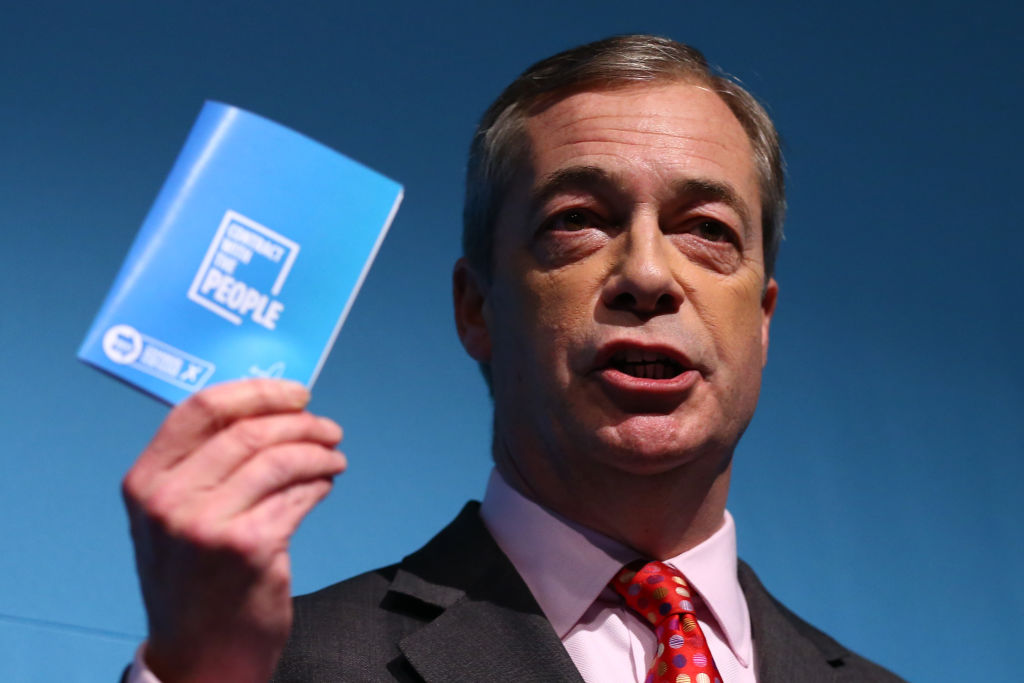Nigel Farage has never been particularly sold on manifestos or the hard slog of policy formulation in general. His aversion dates back at least to the Ukip manifesto of 2010 which was accompanied by detailed policy documents that ran to the length of an old telephone directory and proved a rich source of material for the many commentators seeking to mock the party. He later derided it as “drivel”.
So it is unsurprising to see him release a slim, 24-page booklet printed in large type on A6 pages, several with full-page photographs (rather than text) and to market it not as a manifesto at all, but as a “contract” with the British people.
Given that he admits the Brexit party cannot form a government, it is a moot point as to how such a contract could possibly be enforced. At the risk of being overly brutal, one is tempted to observe that it might as well all be written on the back of an envelope, or even one of Nigel’s old fag packets, so sketchy are the contents and so obviously are they dominated by him and him alone.
There is some standard “swamp-draining” stuff about political process: scrapping the House of Lords, allowing popular sentiment to trigger referendums on particular issues, guaranteeing civil service neutrality and the like.
There are also plenty of straight lifts from those much-derided old Ukip manifestos – such as cutting the foreign aid budget, strictly limiting net migration via combining an upper ceiling with an Australian-style points system, scrapping the BBC licence fee, abolishing inheritance tax, getting rid of VAT on domestic energy bills, cancelling HS2 and making coastal communities a special priority for economic regeneration.
Then there is a plan to rope Nigel’s mate Donald Trump into a global scheme for planting vast numbers of trees, alongside a proposed ban on the UK exporting waste to be dealt with overseas. These ideas at least show he has become aware that denial of climate change or indifference to the natural world is not a look that appeals to a mass audience.
On the NHS, which has often proved Nigel’s political Achilles’ Heel, there is a general pledge to abolish privatisation within it. But this sits oddly alongside another plan, announced by him in newspaper interviews, to offer tax breaks to encourage many people to go private instead.
In Nigel’s views such people – including billionaires – will respond to these tax incentives by taking pressure off the NHS. He wants to see one in ten people drop out of using state provision as a result. In fact, this would undermine the universalist ethos of the service and push it in the direction of becoming an entry-level or safety net offering to be eschewed by anyone with a few quid in the bank.
This simply won’t fly among older, blue-collar workers and pensioners who would naturally form the core of Brexit party support. These are people who have paid their national insurance stamps over many years and naturally expect first class treatment free at the point of need in return.
In Ukip days of yore, Nigel had people like me and Suzanne Evans to challenge him on this stuff. Now his electorally toxic antipathy to Britain’s favourite public service faces no such restraint.
Were Labour especially bothered about an electoral threat from the Brexit party it would be able to rip him to shreds on this agenda, just as it did the Tories back in the days when Liam Fox was punting a so-called “Patient Passport” that would have similarly incentivised people to ditch the NHS and go private.
In fact, I doubt Labour will bother commenting at all. It knows that the Brexit party has already been squeezed hugely in this campaign and further squeezing is more likely to benefit the Tories.
Only once in his career has Nigel got an overall policy offering right – and that was when he arranged for Suzanne Evans to mastermind a full-depth, fully-costed, stress-tested manifesto for the 2015 general election. That document, to which I also contributed, provided a broad-based policy offer that proved vital in preventing Ukip suffering the vicious squeeze in its vote share that the Brexit party is presently undergoing.
There is a happy medium in manifesto land; somewhere between a telephone directory and the back of 20 Rothmans. It takes a lot of hard work to get there. This time round Nigel has just gone for the bullet points. We will see on December 12 whether voters consider that good enough (a clue: they won’t).







Comments